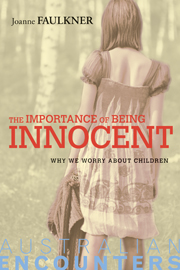Book contents
3 - The communal fantasy and its discontents
The child's place in political community
Published online by Cambridge University Press: 05 July 2011
Summary
Tonight, in our rich and beautiful country, there are children living out a Hobbesian nightmare of violence, abuse and neglect.
Thus former Prime Minister John Howard begins a speech giving his reasons for a military-style federal intervention into Northern Territory Aboriginal communities. The Northern Territory intervention involved the deployment of medical teams, social workers, police and army personnel on a scale unprecedented on Australian soil. It was – and, for Aboriginal peoples, continues to be – a grand assertion of state rule, a claim of legitimacy built on the ability to protect its citizens from savagery. Howard was able to initiate this audacious action – with the support of the Labor Opposition – because the central focus of his plea was the welfare of innocent children (see chapter 5 for further discussion).
The concern of the present chapter is the influence of a history of Western political thought upon how we understand political community and identity, and in turn, on the kinds of policy decisions and value judgements made today with respect to children. The prime minister no doubt had very practical reasons (not solely related to child welfare) for intervening in Northern Territory communities. Yet, curiously, his first port of call when justifying this decision was a 17th century philosopher, Thomas Hobbes. What proportion of the Australian public could Howard expect were au fait with the finer points of Hobbes' social contract theory? The thing is they didn't need to be.
- Type
- Chapter
- Information
- The Importance of Being InnocentWhy We Worry About Children, pp. 50 - 77Publisher: Cambridge University PressPrint publication year: 2010



